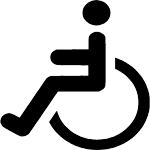2.1 Particulars of the organization
The meeting to launch the Asian and Pacific Decade of Disabled Persons 1993-2002 was convened by the Economic and Social Commission for Asia and Pacific (ESCAP) at Beijing in December, 1992, which adopted the Proclamation on the Full Participation and Equality of People with Disabilities in Asian and Pacific Region. India is a signatory to the said proclamation. Therefore, in order to implement the Proclamation, Government of India enacted The Persons with Disabilities (Equal Opportunities, Protection of Rights and Full Participation) Act, 1995 (hereinafter referred to as the Persons with Disabilities Act), which came into effect from 7th February 1996 which is repealed by the Rights of Persons with Disabilities (RPwD) Act, 2016.
It has been provided in the RPwD Act that there shall be a Chief Commissioner for Persons with Disabilities and every State will have a Commissioner for Persons with Disabilities. Accordingly, office of the Chief Commissioner for Persons with Disabilities was established by the Govt. of India, which started functioning with effect from October, 1998. The office is located at 5th Floor, NISD Building, Plot No.G-2, Sector-10, New Delhi-110075.
The organisation hierarchy of the Office of the Chief Commissioner for Persons with Disabilities is as under:
|
CHIEF COMMISSIONER
|
1
|
|
COMMISSIONER
|
2
|
|
DY. CHIEF COMMISSIONER
|
2
|
|
DESK OFFICER
|
2
|
|
PRIVATE SECRETARY
|
1
|
|
ACCOUNTANT
|
1
|
|
PA
|
6
|
|
RESEARCH ASSISTANT
|
1
|
|
LDC
|
4
|
|
DRIVER
|
1
|
|
PEON
|
2
|
|
SAFAIWALA
|
1
|
2.2 Powers of the Chief Commissioner for Persons with Disabilities
As per Section 77 of the PwD Act, the Chief Commissioner have the same powers as are vested in a court under the Code of Civil Procedure, 1908 while trying a suit, in respect of the following matters, namely -
- summoning and enforcing the attendance of witnesses;
- requiring the discovery and production of any documents;
- requisitioning any public record or copy thereof from any court or office;
- receiving evidence on affidavits; and
- issuing commissions for the examination of witnesses or documents.
Every proceeding before the Chief Commissioner for Persons with Disabilities is a judicial proceeding within the meaning of sections 193 and 228 of the Indian Penal Code and the Chief Commissioner shall be deemed to be a civil court for the purpose of section 195 and Chapter XXVI of the Code of Criminal Procedure, 1973.
Being the Head of the Department, all administrative and financial powers are vested in the Chief Commissioner for Persons with Disabilities or in his/her absence, in the Commissioner/Deputy Chief Commissioner, duly authorized by the Government.
Chief Commissioner is assisted by Commissioner & Dy. Chief Commissioner, Desk Officers and other staff members for discharging his/her duties.
2.3 Functions of the Chief Commissioner for Persons with Disabilities
The functions of the Chief Commissioner, as defined in Section 75 of the RPwD Act, 2016 are as under
(a) identify, suo motu or otherwise, the provisions of any law or policy, programme and procedures, which are inconsistent with this Act and recommend necessary corrective steps;
(b) inquire, suo motu or otherwise, deprivation of rights of persons with disabilities and safeguards available to them in respect of matters for which the Central Government is the appropriate Government and take up the matter with appropriate authorities for corrective action;
(c) review the safeguards provided by or under this Act or any other law for the time being in force for the protection of rights of persons with disabilities and recommend measures for their effective implementation;
(d) review the factors that inhibit the enjoyment of rights of persons with disabilities and recommend appropriate remedial measures;
(e) study treaties and other international instruments on the rights of persons with disabilities and make recommendations for their effective implementation;
(f) undertake and promote research in the field of the rights of persons with disabilities;
(g) promote awareness of the rights of persons with disabilities and the safeguards available for their protection;
(h) monitor implementation of the provisions of this Act and schemes, programmes meant for persons with disabilities;
(i) monitor utilisation of funds disbursed by the Central Government for the benefit of persons with disabilities; and
(j) perform such other functions as the Central Government may assign.
2.4 Mission/Vision Statement
Vision
- An India, which places its citizens with disabilities on the same platform as the non-disabled citizens.
Mission
- To protect the rights of citizens with disabilities
- To create The Rights of Persons with Disabilities so that they can lead a life of Equality and Dignity.
- To promote an Inclusive, Barrier-free and Rights-based Society for Persons with Disabilities.
2.5 Mechanism available for monitoring the service delivery and procedure for redressal of public grievance
For monitoring and reviewing the status of implementation of the RPwD Act, reports are called from the Commissioners, Disabilities of the States/UTs. Besides, an annual meeting of State Commissioners per Persons with Disabilities of the States/UTs is organized by the Office of the CCPD for the purpose.
Office of the Chief Commissioner for Persons with Disabilities also conducts workshops for creating awareness and promotion of major focus areas such as inclusive education, employment opportunities for persons with disabilities, barrier free environment, etc. In the year 2005-06, Training Workshops are also being conducted for creation of "Resource Pool of Access Auditors" throughout the country. The services of the trained Access Auditors will be utilized by the concerned organizations for creating barrier free built environment at public places or public utility buildings.
Office of the CCPD, on its own motion or on the application of any aggrieved person takes up the matter related to non-implementation of Act, Rules, Laws, Instructions issued by the Government organizations, etc. with the concerned organizations.
The procedure for submission of complaints before the Chief Commissioner for Persons with Disabilities has been prescribed in Rule 38 of the RPwD Rules, 2017 which is as under -
(1) An aggrieved person may present a complaint containing the following particulars in person or by his agent to the Chief Commissioner or the Commissioner or send it by registered post or by email addressed to the Chief Commissioner or the Commissioner, namely:-
(a) the name, description and the address of the aggrieved person;
(b) the name, description and the address of the opposite party or parties, as the case may be, so far as they may be ascertained;
(c) the facts relating to complaint and when and where it arose;
(d) documents in support of the allegations contained in the complaint; and
(e) the relief which the aggrieved person claims.
(2) The Chief Commissioner or the Commissioner on receipt of a complaint shall refer a copy of the complaint to the opposite party or parties mentioned in the complaint, directing him to give his version of the case within a period of thirty days or such extended period not exceeding fifteen days as may be granted by the Chief Commissioner or the Commissioner.
(3) On the date of hearing or any other date to which hearing could be adjourned, the parties or their agents shall appear before the Chief Commissioner or the Commissioner.
(4) Where the aggrieved person or his agent fails to appear before the Chief Commissioner or the Commissioner on such days, the Chief Commissioner or the Commissioner may either dismiss the complaint on default or decide on merits.
(5) Where the opposite party or his agent fails to appear on the date of hearing, the Chief Commissioner or the Commissioner may take such necessary action under section 77 of the Act as he deems fit for summoning and enforcing the attendance of the opposite party.
(6) The Chief Commissioner or the Commissioner may dispose of the complaint ex-parte, if necessary.
(7) The Chief Commissioner or the Commissioner may on such terms as he deems fit and at any stage of the proceedings, adjourn the hearing of the complaint.
(8) The Chief Commissioner or the Commissioner shall decide the complaint as far as possible within a period of three months from the date of receipt of notice by the opposite party.
In accordance with the above procedure, the complaints received by post, facsimile or e-mail are put up to the Chief Commissioner/Commissioner/Deputy Chief Commissioner.
The show cause notices are quite detailed pointing out the violation of the relevant provision of the Section of the Act, Rules, Regulations etc. and the possible remedial action that the respondent should take. If the remedial action is taken, the case is disposed off at that stage itself and appropriate order is passed. In other cases, on receipt of the replies of the opposite parties, the complainant is given the opportunity to file rejoinder. Thereafter, parties are given personal hearings by issuing summons.
After hearing the parties, the Record of Proceedings containing interim order/advice are prepared on the spot and handed over to the parties.
Office of the Chief Commissioner also suo motu takes up a large number of cases on the basis of advertisements released by the establishments. Most of these cases pertain to reservation of vacancies in appointments and reservation of seats in admission to various courses of studies conducted by Government or Government aided educational institutions.
A large number of people with disabilities or their representatives are also given personal hearings even without any written complaint or prior appointment. Often, Complainants are assisted by the Officers and Staff Members in preparing representations/complaints and are also counseled.














